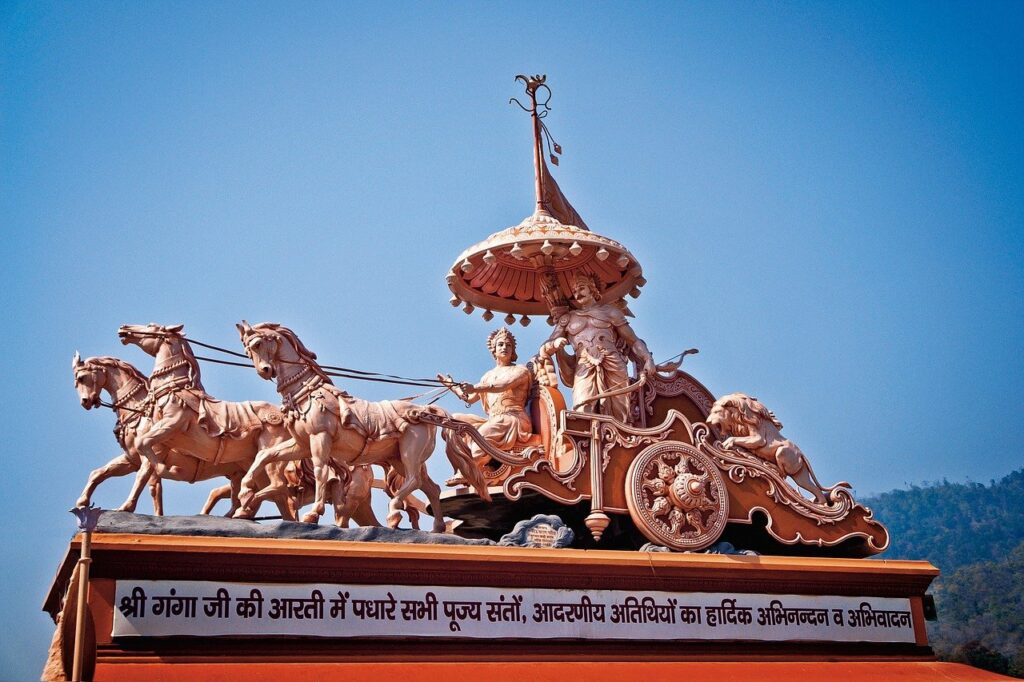
The following article provides a detailed account of the momentous 18-day Kurukshetra War as narrated by Sanjaya to Dhritarashtra. Known as the epic Mahabharata, the Kurukshetra War stands as a central theme within this Hindu epic. The conflict unfolded between two factions of cousins, namely the Kauravas and the Pandavas, in a gripping struggle for the rightful dynastic succession to the throne of Hastinapura, situated in the ancient Indian kingdom of Kuru.
This monumental clash saw a multitude of ancient kingdoms joining forces as allies of their respective sides, amplifying the scale of the confrontation that transpired on the sacred battleground of Kurukshetra, now situated within the boundaries of the modern Indian state of Haryana. In the heart of this grand spectacle, Duryodhana commanded an impressive army of 11 Akshouhinis, while the Pandavas marshaled a force of 7, collectively totaling eighteen formidable divisions. Remarkably, the epic itself comprises eighteen chapters, each unveiling a distinct facet of the unfolding narrative. The conflict spanned an exact eighteen days, from the break of dawn to the setting sun.
dhrtarastra uvaca
dharma-ksetre kuru-ksetre
samaveta yuyutsavah
mamakah pandavas caiva
kim akurvata sanjaya
(Bhagavad Gita 1.1)
–
Dhritarashtra inquired, “O Sanjaya, upon gathering at the sacred site of Kurukshetra, what actions did my sons and the offspring of Pandu undertake, driven by their urge to engage in battle?”
Day 1 of Kurukshetra – The Battle Commences
On the first day of the Kurukshetra war, major events unfolded as follows:
Arjuna’s Uncertainty: The warriors on the Pandava side watched as Arjuna spoke with Lord Krishna. Arjuna had been uncertain about fighting against his own relatives and teachers.
Arjuna Regains Resolve: Arjuna regained his resolve and stood ready for battle with his bow Gandiva held high. This boosted the morale of the Pandava warriors.
Celestial Spectators: Celestial beings, including rishis and Siddhas, gathered in the sky to witness the battle. They marveled at Arjuna’s chariot with Krishna as his charioteer.
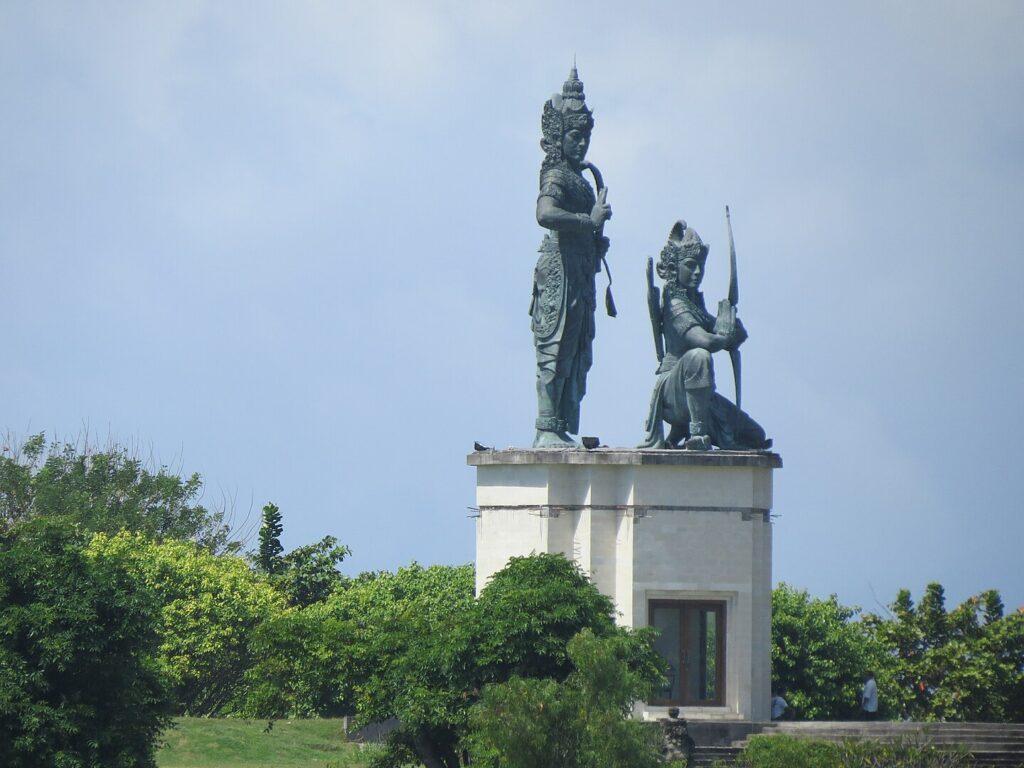
Yudhishthira’s Approach: Yudhishthira, the Pandava king, took off his armor and approached Bhishma, his grandfather, with humility. He sought permission and blessings to fight against his revered elders.
Yudhishthira’s Interactions: Yudhishthira approached Bhishma, then Drona, and later Kripa, seeking permission to fight. All three blessed him and granted their permission, despite their allegiance to the Kauravas.
Yuyutsu Joins Pandavas: Yuyutsu, a son of Dhritarashtra and a half-brother to the Kauravas, decided to fight for the Pandavas. He switched sides and was accepted by Yudhishthira.
Battle Commences: The battle between the two armies began with a tumultuous uproar. Warriors from both sides clashed with their weapons, creating chaos and destruction.
Bhishma’s Valor: Bhishma, fighting with great prowess, single-handedly wreaked havoc in the Pandava army. His skill and power were evident as he repelled numerous attacks.
Abhimanyu’s Duel with Bhishma: Abhimanyu, Arjuna’s son, challenged Bhishma and engaged him in a fierce duel. Bhishma’s protectors tried to stop Abhimanyu, but he fought valiantly.
Sweta’s Duel with Bhishma: Sweta, a warrior from the Kaurava side, engaged Bhishma in a fierce fight. Despite Sweta’s courage, Bhishma ultimately killed him using a powerful arrow.
End of the Day: As the sun set, both sides withdrew their troops and entered their camps for the night. The day’s battle ended with both joyous celebrations from the Kauravas and solemnity from the Pandavas.
Day 2 of Kurukshetra – Kauravas suffer heavy Losses
Bhishma’s Fierce Attack on Pandavas:
The second day of battle saw the Pandava forces forming the Krauncha formation, with Bhishma leading the Kaurava attack personally. Bhishma’s gold-winged arrows struck with deadly accuracy, causing havoc among the Pandava troops. He engaged in a fierce battle with prominent Pandava fighters, including Drstadyumna, Abhimanyu, Bhima, and Arjuna. Despite the onslaught, Arjuna remained resolute and retaliated.
Arjuna’s Duel with Bhishma:
Arjuna, witnessing the carnage caused by Bhishma, was infuriated. He sought Krishna’s guidance and made his way toward Bhishma. The sky was filled with arrows as Arjuna’s deadly shots created chaos among the Kaurava forces. The duel between Arjuna and Bhishma escalated, with each fighter displaying incredible prowess. Krishna’s skillful chariot driving made it difficult for Bhishma to target Arjuna effectively, and the fight reached an impasse.
Bhima’s Unstoppable Rampage:
Bhima, in the midst of the battle, faced overwhelming odds against the Kalinga and Nisadha forces. Undaunted, Bhima displayed superhuman strength and skill. With his mighty sword and mace, he cut through enemy lines, leaving a trail of destruction. He single-handedly engaged numerous opponents, including Ketumat and Srutayush, decimating their forces. Bhima’s relentless attack caused panic among the Kaurava troops.
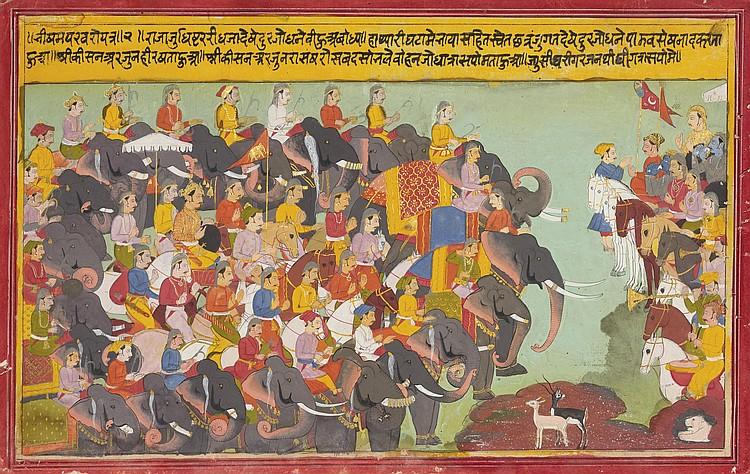
Drstadyumna’s Struggle and Intervention:
Drstadyumna engaged in a fierce duel with his guru, Drona. Their battle was as intense as that between Arjuna and Bhishma. Drstadyumna attempted to strike Drona with a powerful dart, but Drona’s skillful arrows shattered it. Drstadyumna’s chariot was disabled, and Bhima intervened to rescue him, whisking him away to safety.
Bhima’s Triumph and Retreat:
Despite facing overwhelming odds, Bhima’s relentless rampage continued. He wiped out entire enemy armies and forced survivors to flee. Bhima’s mighty blows and powerful weapon strikes created a scene of chaos and devastation. The Kaurava forces were left in awe of his ferocity and determination. The battle eventually drew to a close as twilight fell, and the soldiers retreated to their respective encampments.
Day 3 of Kurukshetra – Dynamic Events and Legendary Duels
Formation of Garuda Vyuha by Kurus and Pandavas’ Crescent Counter:
On the third day of the battle, the Kurus arranged their forces into the formidable Garuda vyuha, resembling a divine eagle with Bhisma at its neck and other skilled warriors at various positions. In response, the Pandavas countered with a crescent-shaped formation, positioning their skilled heroes strategically. The clash of these formations marked a pivotal moment in the battle, setting the stage for intense combat and strategic maneuvers.
Arjuna’s Ferocious Display of Prowess:
As the battle raged on, Arjuna’s prowess took center stage. Guided by Krishna, he unleashed a torrent of arrows that struck down his opponents by the thousands. His relentless assault carved a path through the Kaurava forces, leaving devastation in its wake. Arjuna’s exceptional skill and determination became a beacon of inspiration for the Pandava ranks.
Duryodhana’s Bold Challenge and Bhima’s Swift Response:
Duryodhana, recognizing the threat posed by Arjuna, personally confronted Bhima on the battlefield. In a swift and powerful move, Bhima launched an iron arrow that felled Duryodhana, momentarily throwing the Kaurava supporters into disarray. This episode showcased Bhima’s unwavering resolve and his ability to swiftly turn the tide of battle in favor of the Pandavas.
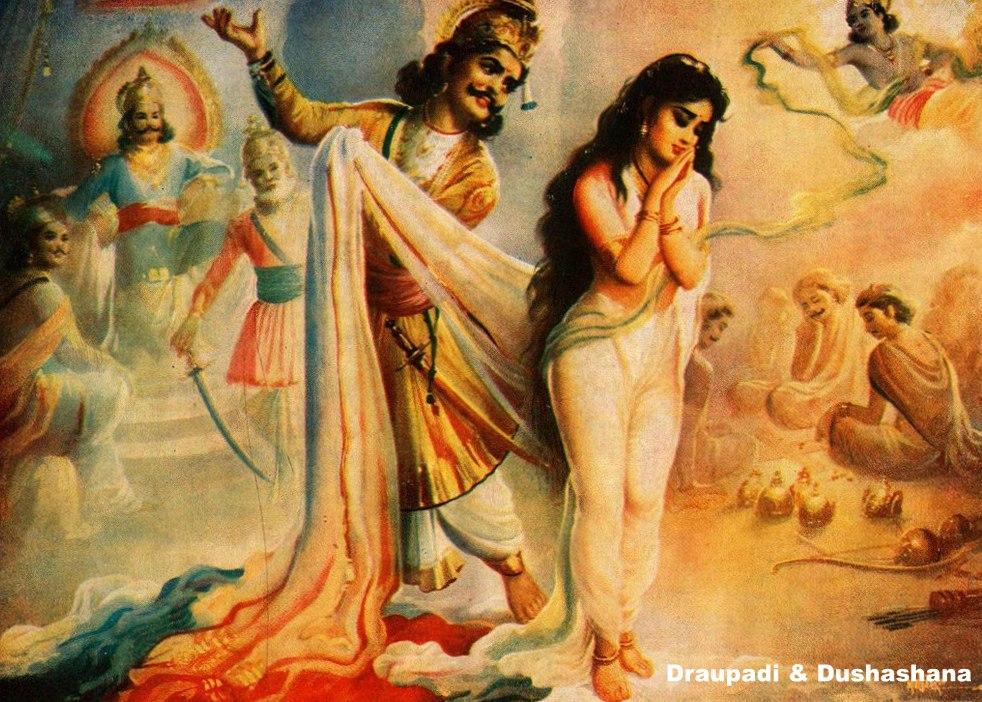
Bhisma’s Unstoppable Onslaught:
As the day progressed, Bhisma emerged as a dominant force on the battlefield. His unparalleled skill with the bow and arrows wreaked havoc among the Pandava ranks. Despite their valiant efforts, the Pandava forces struggled to withstand Bhisma’s relentless assault, and the field became strewn with fallen warriors. Bhisma’s prowess became a formidable challenge that the Pandavas had to confront.
Arjuna’s Duel with Bhisma:
Amidst the chaos, Arjuna engaged in a fierce duel with Bhisma. Arjuna’s determination to overcome the invincible Bhisma led to a dramatic confrontation. Arjuna managed to break Bhisma’s bows, and Bhisma acknowledged Arjuna’s remarkable skill. This duel symbolized the clash between two legendary warriors, each striving to prove their mettle on the battlefield.
Renewed Determination and Dhrtarastra’s Hope:
Despite the challenges posed by Bhisma, the Pandavas regrouped and renewed their determination. As the day came to a close and both sides withdrew from the field, Dhrtarastra found encouragement in the Kauravas’ performance. The third day of battle had witnessed heroism, strategic tactics, and fierce clashes, setting the stage for the challenges and possibilities that lay ahead.
The third day of the battle showcased pivotal moments that shaped the course of the conflict. From strategic formations to intense duels, the dynamics of the battlefield evolved, leaving a significant impact on both the Kurus and the Pandavas as they prepared to face the trials of the upcoming days.
Day 4 of Kurukshetra – Bhima’s Triumph and Kaurava’s Retreat
Arjuna’s Alligator Formation and Kauravas’ Counter:
The fourth day of the battle began with Arjuna orchestrating the Pandava forces into an alligator-shaped vyuha. This formation exuded the appearance of massed clouds, casting an imposing sight. In response, the Kauravas formed a counter-array and advanced towards the Pandava position. The collision of these two formations sent shockwaves through the earth, setting the stage for yet another day of intense combat.
Renewed Energy and Heroic Clashes:
Arjuna’s strategic formation rekindled the Pandavas’ determination, and with Krishna’s encouragement, they engaged with revitalized energy. As the battle commenced, the leading chariot fighters from both sides clashed fiercely. Infantry troops engaged in close combat on the battlefield, creating a cacophony of sounds. The Pandavas, still recovering from their confrontation with Bhisma, fought valiantly, inflicting heavy casualties on the Kaurava forces.
Bhima’s Search for Dhrtarastra’s Sons:
With his vow to eliminate Dhrtarastra’s sons in mind, Bhima embarked on a mission to locate and defeat them. Roaming across the battlefield, he left destruction in his wake. His sights were set on Duryodhana’s brothers, a group he believed would provide the opportunity to fulfill his vow.
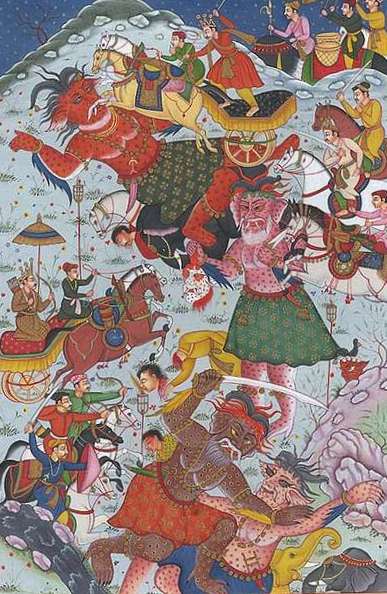
Bhima’s Fierce Encounter with Elephants:
Spotting Duryodhana’s chariot surrounded by his brothers, Bhima seized the moment. Armed with his iron mace, Shaikya, he confronted a division of charging elephants. Fearlessly, Bhima engaged the massive creatures, using his mace to shatter them with each strike. His presence alone was enough to halt the advancing elephant warriors, as Bhima’s strength and ferocity proved insurmountable.
Pandava Allies’ Support and Abhimanyu’s Feats:
Abhimanyu and other Pandava allies joined Bhima in the battle against the elephants. Their razor-headed arrows beheaded the riders on the elephants, creating a scene akin to trees stripped of their tops. Abhimanyu’s skill and precision were evident when he targeted the leader of the elephant division, Maghadaraja, and dispatched him with a well-aimed arrow.
Bhima’s Devastating Mace Strikes:
Bhima’s mace wreaked havoc among the elephant forces, rendering them powerless against his mighty blows. With each strike, elephants fell, their heads broken and bodies injured. Bhima’s rampage was reminiscent of the cosmic dance of destruction performed by the god Siva. His prowess on the battlefield was undeniable, and his presence alone created terror among his foes.
Bhima vs. Duryodhana and Kaurava Counterattack:
Duryodhana, recognizing Bhima as a significant threat, issued a challenge. Bhima responded with determination, and his allies rallied alongside him. The Pandavas faced the charging Kaurava forces with unwavering resolve, meeting them with a barrage of weapons. Bhima’s resilience in the face of overwhelming odds likened him to an immovable mountain against the surging sea.
Bhima’s Duel with Duryodhana and Slaying of Kaurava Brothers:
Duryodhana and his brothers attempted to subdue Bhima, but he fought back fiercely. Bhima engaged Duryodhana in a fierce duel, demonstrating his determination and skill. In a brutal confrontation, Bhima slew all fourteen of Dhrtarastra’s sons surrounding Duryodhana, leaving their lifeless bodies strewn on the battlefield.
Bhisma’s Intervention and Nightfall:
Bhisma rushed to support Duryodhana and rallied the Kaurava forces. The battle escalated into a widespread conflict, with warriors from both sides engaging in intense combat. As dusk approached, Ghatotkaca and his Raksasa followers heightened the destruction among the Kauravas, leveraging the cover of night to their advantage.
Kaurava’s Retreat and Pandava Victory:
Witnessing the Kauravas suffering in the battle, Bhisma ordered a retreat. The Kaurava forces withdrew from the battlefield, marking a respite for the Pandavas. Victorious and elated, the Pandava warriors returned to their camp with Bhima and Ghatotkaca as their heroes. The fourth day had been defined by Bhima’s might, valor, and strategic prowess, leaving the Kauravas reeling and the Pandavas triumphant.
Day 5 of Kurukshetra – Relentless Conflict and Heroic Exploits
As dawn broke on the fifth day, the relentless battle resumed. The previous day’s fallen warriors had been cremated, clearing the battlefield for another day of fierce conflict. Both sides were consumed by the frenzy of war, resulting in unceasing bloodshed. Arjuna showcased his exceptional prowess, wielding the Gandiva bow with the speed of lightning, showering arrows in all directions. The Pandava heroes, including Abhimanyu, Bhima, the twins, Satyaki, and Yudhisthira, furthered the devastation among the Kaurava ranks.
Kaurava Counter and Fierce Rivalries:
On the Kaurava side, Bhisma and his formidable comrades persisted in decimating the Pandava army. Rivalries flared as Sikhandi sought to confront Bhisma multiple times, only to find himself rebuffed. Similarly, Drstadyumna relentlessly pursued the chance to defeat Drona, but the Kuru preceptor repelled the attacks and answered with his own relentless assault. Despite the challenges, these warriors remained undeterred, repeatedly stepping into the fray.
Bhima’s Determined Pursuit and Mighty Feats:
Bhima remained steadfast in his quest to neutralize Dhrtarastra’s sons. Roaming the battlefield, he resembled the god of death, ready to claim his victims. Armed with his mace, Bhima relentlessly sought opportunities to engage in combat, demonstrating his versatility by switching between his mace and his bow. His presence remained a source of terror for the Kurus.
Sixth and Seventh Days: Intense Skirmishes and Prolonged Conflict
The sixth and seventh days unfolded with a continuation of the relentless battle. While the casualty count escalated, none of the principal warriors from either side had fallen. Arjuna’s formidable skills were a source of concern for Duryodhana, who assigned Susharma and his Samshaptakas to challenge Arjuna each day. These skirmishes saw Arjuna prevailing and claiming thousands of lives among the Samshaptakas.
Pandava Persistence and Duryodhana’s Resoluteness:
Despite being outnumbered, the Pandava forces persisted in wearing down the Kaurava opposition. Duryodhana’s frustration grew, and he reproached Bhisma and Drona, accusing them of favoring the Pandavas. Both Bhisma and Drona tried to reason with Duryodhana, advocating for peace and an end to the war. However, Duryodhana remained steadfast in his determination to continue the battle.
Unrelenting Conflict:
The fifth, sixth, and seventh days of the battle were marked by unceasing conflict and intense clashes. Arjuna’s prowess and the dedication of Pandava warriors caused heavy casualties among the Kauravas. The rivalries between key warriors, the determination to fulfill vows, and the relentless pursuit of victory underscored the ferocity of the ongoing war. Despite the toll on both sides, the resolve to fight on remained unyielding.
Day 8 of Kurukshetra – Fall of Iravan
On the eighth day of the war, Bhima emerged as a formidable force on the battlefield. He killed seventeen of Duryodhana’s brothers in a relentless onslaught. Despite their attempts to surround him and attack, Bhima mowed down his enemies using arrows with unwavering determination. He aimed to eliminate all of Duryodhana’s brothers in one go. However, Drona intervened, showering Bhima with arrows until he was obscured from view, allowing the remaining brothers to escape.
Celestial Hero and The Naga Fighters:
Amidst the chaos, Arjuna’s son Iravan, born of the Naga princess Ulupi, joined the battle. He commanded a division of warriors mounted on horses from the Himalayan highlands. These fearsome warriors charged at the Kauravas with their horses clad in armor and gold adornments, causing havoc among their ranks.
Nagas vs. Gandhara Fighters:
Iravan’s Naga cavalry confronted the Gandhara warriors, led by Sakuni’s six younger brothers. These warriors, driven by the desire for victory or heaven, engaged in a fierce encounter. Iravan’s cavalry showcased exceptional riding and combat skills, overpowering their opponents with their mastery of weapons and tactics. Iravan himself displayed immense strength and courage, facing the Gandhara fighters head-on.
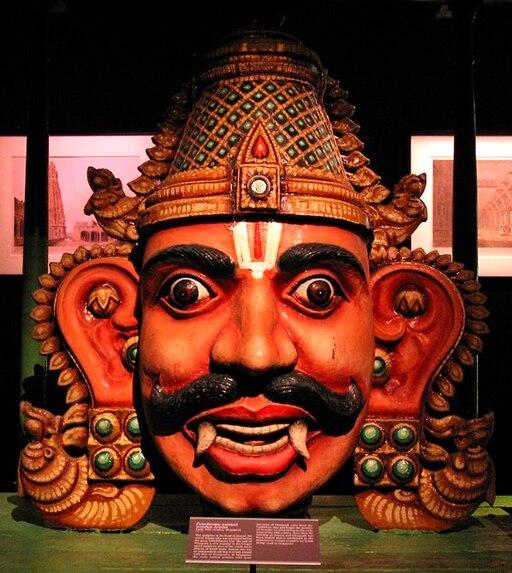
Alambusha’s Challenge and Ghatotkaca’s Fury:
Vrishaba, the sole surviving prince from Gandhara, informed Duryodhana of the annihilation of their forces. Enraged, Duryodhana summoned Alambusha, a terrifying Raksasa, to confront Iravan. Alambusha, fueled by his hatred for Bhima, engaged in a fierce battle against Iravan. Ghatotkaca, witnessing his cousin’s death, unleashed a powerful roar of anger that struck terror into the Kauravas. He joined the fight, and his presence on the battlefield sent shockwaves through the enemy ranks.
Ghatotkaca’s Wrath and Duryodhana’s Challenge:
Ghatotkaca, backed by a horde of Raksasas, unleashed his fury upon the Kauravas. His trident and the ferocity of his allies dispersed the enemy forces like a gust of wind sweeping away debris. Duryodhana confronted Ghatotkaca’s onslaught with his own might, exhibiting remarkable skills and determination.
Arjuna’s Battle with the Samshaptakas:
Meanwhile, Arjuna continued to engage the Samshaptakas, led by Susharma. Despite being equipped with divine weapons, Arjuna chose to fight conventionally, using his Gandiva bow to fend off the fierce attacks of the enemy. Arjuna received news of Iravan’s death during the battle, which deepened his grief and anger.
Vow for Vengeance:
Arjuna’s grief for Iravan turned into anger against Duryodhana. Despite his heartache, Arjuna vowed to continue fighting and avenge his son’s death. Krishna supported him as they resumed battling the Samshaptakas.
Bhima vs. Duryodhana and Evening Carnage:
As the sun set, a fierce confrontation erupted between Bhima and Duryodhana. Bhima’s mighty blows threatened to end Duryodhana’s life, but Jayadratha intervened, and Krpa assisted Duryodhana onto his chariot. Bhima and Abhimanyu engaged in intense combat against the Kaurava forces, resulting in widespread destruction.
Eighth Day’s End: Scenes of Carnage and Nightfall:
The day concluded with the battlefield strewn with the fallen, broken weapons, and discarded armor. Both sides withdrew for the night, acknowledging each other’s valor. The day’s events showcased the relentless determination of the warriors, the tragic loss of Iravan, the fiery clashes between the Nagas and the Gandhara fighters, and the intense struggles between the key figures of the battle.
Day 9 of Kurukshetra – Krishna charges towards Bhishma
On the ninth day of the war, Bhisma took charge of the Kaurava army and organized them in the formation named Sarvabhadra, resembling an eagle with outspread wings. With various skilled warriors, he stationed himself at the front and center, while other heroes guarded the wings. Duryodhana, surrounded by his brothers, stood in the middle, protected by Drona and his son. Alambusha and his Raksasa forces were stationed in the rear.
Duryodhana expressed his hope that Bhisma’s power would scatter the Pandavas, but he worried about the prophesied threat from Shikhandi. Duryodhana ordered warriors to protect Bhisma and assigned others to prevent Sikhandi from reaching him.
Both armies clashed fiercely with war cries and blaring instruments. Abhimanyu displayed remarkable skill, decimating Duryodhana’s division. He was confronted by Alambusha, a powerful Raksasa, who wreaked havoc on the Pandava forces. Abhimanyu’s prowess prevailed, and Alambusha was forced to flee.
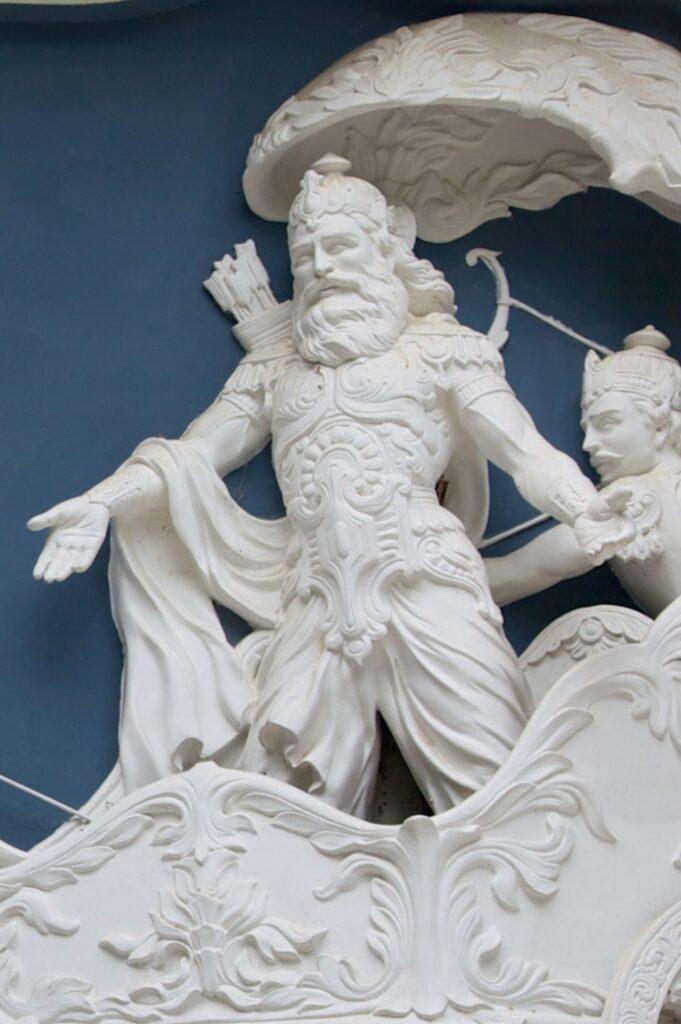
Amidst the chaos, Bhisma led the Kaurava troops, battling fiercely. Arjuna, accompanied by Krishna, confronted Bhisma, but was unable to fight wholeheartedly due to his respect for his grandfather. Krishna, realizing the need to intervene, grabbed a chariot wheel as a makeshift weapon and advanced towards Bhisma. Arjuna, following Krishna, managed to halt Him before He reached Bhisma, reminding Krishna of His vow not to fight in the war.
Krishna’s anger subsided, and Arjuna pledged to fulfill his promise to defeat Bhisma. The day ended with both sides blowing conches and retreating to their camps.
Bhisma remained in awe of Krishna’s display of power and restraint, reflecting on the Lord’s role in the unfolding events. The image of Krishna with an upraised wheel and the memory of their confrontation stayed with him as the armies prepared for the night.
Day 10 of Kurukshetra – Fall of Bhishma
On the tenth day of the war, the battle raged fiercely between the Pandavas and the Kauravas. The Pandavas organized their forces with Sikhandi at the forefront, flanked by Bhima and Arjuna. Bhisma stood at the center of the Kaurava formation, guarded by Duryodhana and his best fighters. The clash began with immense slaughter, and Bhisma fought with unmatched vigor, unleashing a relentless barrage of arrows that decimated the enemy forces.
Sikhandi challenged Bhisma, and despite being infuriated by his opponent’s words, Bhisma chose not to fight against him, knowing that Sikhandi was previously a woman. Arjuna joined Sikhandi’s assault, with both of them piercing Bhisma’s armor. The battle intensified as Arjuna targeted Bhisma repeatedly. Bhisma, aware of his impending fall, fought valiantly, taking on Arjuna and numerous other Pandava warriors. Dushashana also entered the fray to protect Bhisma.
Arjuna’s determination to defeat Bhisma grew stronger, and he engaged in a fierce exchange of arrows. Sikhandi and Arjuna together managed to break Bhisma’s bow and cut down his standard. Bhisma, realizing the inevitable, lowered his weapons, knowing that he couldn’t win against Arjuna with Krishna by his side.
Bhisma continued to resist Arjuna’s attacks, but eventually, Arjuna and Sikhandi’s arrows pierced Bhisma deeply. With Arjuna’s arrows engulfing him, Bhisma finally fell from his chariot. He chose to lie on a bed of arrows, waiting for the sun to change its course before passing away. Bhisma reassured the Kauravas and Kuru leaders, acknowledging his impending end and his readiness to embrace it.
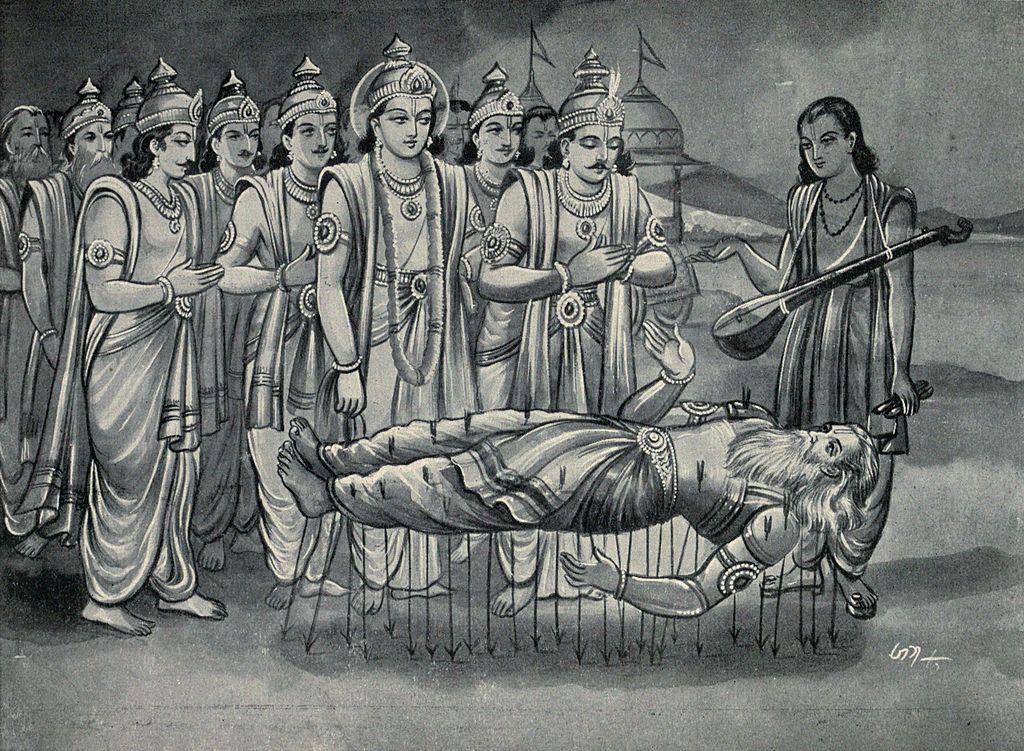
The Kauravas were overwhelmed by grief and sorrow at the fall of their beloved commander. Bhima danced in victory, while Arjuna knelt by Bhisma’s side to offer his respects. Bhisma expressed his satisfaction with the arrows forming his pillow and imparted his blessings to Arjuna.
With the fall of Bhisma, the Kauravas were disheartened and Duryodhana’s remorse grew. The Pandavas paid their respects to Bhisma before retiring to their camp, feeling a sense of assurance in Krishna’s protection and guidance. The Kauravas, on the other hand, were filled with grief and desolation.
Day 11 of Kurukshetra – Karna’s Rampage and Drona’s Unyielding Onslaught
On the eleventh day of the war at Kurukshetra, the battlefield once again witnessed the clash of armies. Karna, entering the fray with fresh vigor, wreaked havoc among the Pandava forces, striking fear into their hearts. The Kauravas rejoiced, confident that Karna’s might could crush their foes and turn the tide of battle. The conflict echoed for miles, causing animals in distant forests to flee in terror as dust clouds enveloped the sun.
Drona, a formidable warrior, charged into the Pandava ranks, releasing a barrage of razor-sharp arrows that tore through their ranks like a gale through cranes. He invoked celestial weapons, decimating his enemies as if he were the divine Indra vanquishing the Asuras. The Pandava forces quivered before his onslaught, reminiscent of Yamaraja wielding his staff of death.
Yudhisthira, alarmed by the devastation, urgently commanded Drstadyumna to counter Drona’s assault. Warriors including Bhima, the twins, and Abhimanyu rallied behind Drstadyumna and engaged Drona. However, Drona’s incredible skill and speed repelled their attacks, scattering men and chariots in all directions. The battle raged fiercely, with warriors from both sides engaging in one-on-one combat.
Drona’s focus on fulfilling his promise to Duryodhana drove him to continue his relentless charge against the Pandava forces. Amidst the chaos, Yudhisthira and Arjuna held strategic positions, while Duryodhana orchestrated a plan to engage Arjuna and divert him from protecting his brother.
As Drona surged forward, he clashed with Kumara, a Panchala prince guarding Yudhisthira’s chariot wheels. A fierce exchange of arrows ensued, resulting in Kumara’s death by Drona’s arrow. Other Panchala princes, Simhasena and Vyaghradatta, also fell to Drona’s lethal aim. The Kaurava troops cheered as Drona approached Yudhisthira, hoping to capture him.
However, Arjuna emerged as a formidable obstacle. With Hanuman depicted on his banner, Arjuna cut down Kaurava warriors in his path, his swift and relentless arrow barrage creating an impenetrable barrier. The Kaurava forces desperately charged Arjuna, but his onslaught decimated their ranks and shattered their chariots. Drona’s attempts to reach Yudhisthira were thwarted by Arjuna’s prowess.
As the sun set on the horizon, Drona sounded his conch, signaling the withdrawal of troops. The two armies retreated to their camps, acknowledging each other’s valor. Drona, disheartened by his inability to capture Yudhisthira due to Arjuna’s might, lamented his failure to Duryodhana. He strategized with Duryodhana to find a way to separate Arjuna from Yudhisthira and fulfill their goals on the battlefield.
Day 12 of Kurukshetra – Drona tries to capture Yudhisthira
The twelfth day of the Kurukshetra war saw another fierce clash between the opposing armies. Karna, entering the battle with renewed strength, cut a path of devastation through the Pandava forces, filling the Kaurava soldiers with delight. The chaos of battle echoed for miles, causing animals in distant forests to flee in fear, while billowing clouds of dust obscured the sun, shrouding the field in a tawny haze.
Drona, driven by his promise to Duryodhana, charged into the Pandava army, releasing a barrage of razor-sharp arrows that cleaved through their ranks. His celestial weapons ravaged the battlefield, evoking terror akin to Indra’s victory over the Asuras. The Pandava forces trembled as Drona moved with the relentless intent of Yamaraja, wielding his staff of death.
Witnessing the devastation, Yudhisthira urgently ordered Drstadyumna to halt Drona’s advance. Drstadyumna, Bhima, the twins, Abhimanyu, and other warriors engaged Drona in combat, attempting to restrain his onslaught. However, Drona’s blinding speed and accuracy repelled their efforts, scattering men and chariots in disarray. In a frenzy, Drona released fire-like weapons, and the Pandava forces fled in chaos and terror.
Drona’s relentless bowstring resounded continuously as he inflicted heavy casualties on the Pandava soldiers, much like Bhisma had done previously. Simultaneously, other valiant warriors from both sides clashed in furious one-on-one battles across the field.
Focused on fulfilling his promise, Drona pressed on against the Pandava forces. Yudhisthira, guarded by skilled maharathas, remained at the center, while Arjuna fought against powerful chariot fighters assigned to lead him away from his brother.
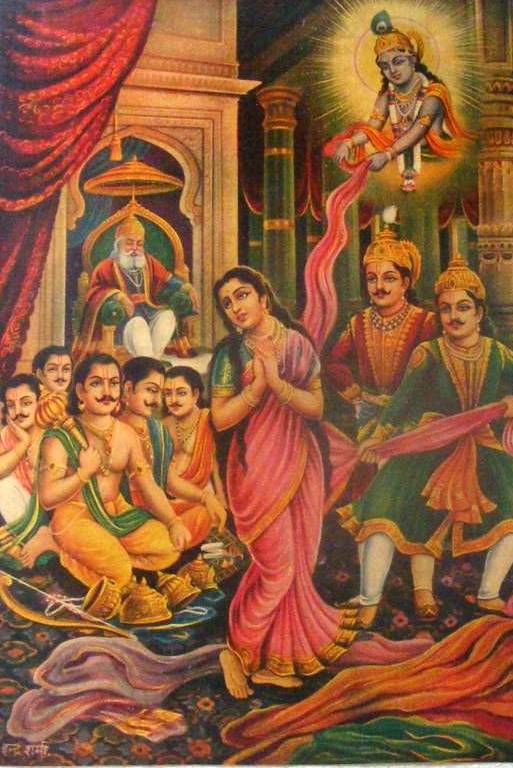
Drona’s advance toward Yudhisthira was met by Kumara, a Panchala prince defending Yudhisthira’s chariot. Kumara’s volleys of arrows momentarily halted Drona, but Drona’s deadly arrow severed Kumara’s head. The Panchala prince Simhasena also confronted Drona, but both he and his brother Vyaghradatta fell to Drona’s swift arrows.
As Drona approached Yudhisthira, Arjuna raced to his defense. Arjuna’s relentless arrow barrage created a network of destruction, with Hanuman depicted on his banner. Duryodhana ordered thousands of chariot fighters to charge at Arjuna, but their reckless assault only led to their demise, with Arjuna’s arrow wall cutting them down.
Drona’s attempts to reach Yudhisthira were thwarted by Arjuna’s fierce defense. As the sun set, Drona sounded his conch, signaling the withdrawal of troops. The two armies disengaged and returned to their camps, acknowledging each other’s valor.
Despite Drona’s relentless push, his inability to reach Yudhisthira weighed heavily on him. He strategized with Duryodhana to devise a plan to separate Arjuna from his brother and achieve their objectives on the battlefield.
Day 13 of Kurukshetra – Fall of Abhimanyu
On the thirteenth day of the war, the battle continued with great intensity. Drona, the Kaurava commander, decided to deploy the chakravyuha formation, a circular array, to trap the Pandava army. Only Arjuna knew how to penetrate this formation, but the Pandavas were left vulnerable after his departure to fight elsewhere. Drona ordered his forces to form the chakravyuha, and Susharma, a Kaurava ally, was instructed to challenge Arjuna and draw him away.
Abhimanyu, Arjuna’s son, rose to the occasion. Though young, he possessed formidable skills and knowledge passed on by his father. Seeing Susharma’s challenge, Abhimanyu left the Pandava army and rushed towards him. Gradually maneuvering, he moved southward as Drona formed the chakravyuha.
As the Kaurava forces advanced in their circular formation, Abhimanyu skillfully broke into their ranks, causing chaos and destruction. He single-handedly fought numerous Kaurava heroes and soldiers, displaying immense courage and skill. Abhimanyu’s prowess was unparalleled, and he relentlessly attacked the enemy, cutting through their ranks like a whirlwind.
Inside the chakravyuha, Yudhisthira realized that only Arjuna knew how to break the formation. Yudhisthira turned to Abhimanyu, acknowledging his knowledge of the formation’s secrets, and urged him to smash through the enemy troops. Abhimanyu accepted the challenge and charged ahead, driven by the determination to uphold his family’s honor.
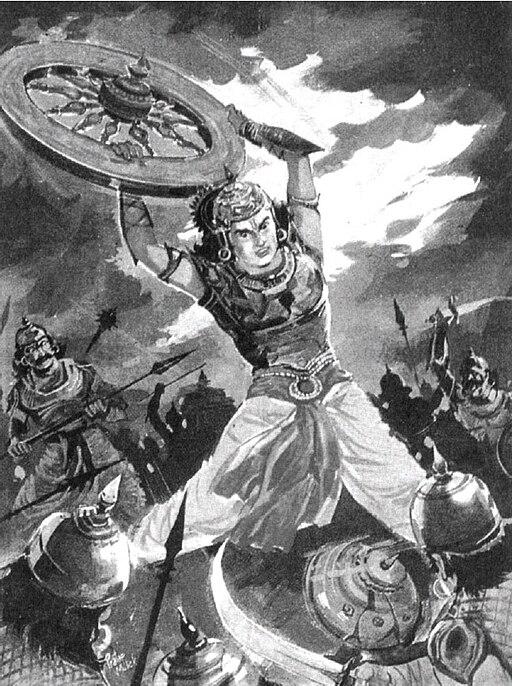
Abhimanyu’s fighting was fierce and relentless. He displayed incredible martial skills, slaying thousands of Kaurava warriors and cutting a path through their ranks. Despite his youth, he was a force to be reckoned with. Even the Kaurava leaders were awestruck by his abilities. The battle continued with Abhimanyu carving a path of destruction, and the Kauravas struggled to stop him.
In their attempts to halt Abhimanyu’s rampage, six Kaurava warriors, including Drona and Karna, coordinated their attacks. Abhimanyu’s bow was broken, his horses were killed, and his charioteer was slain. Facing overwhelming odds, Abhimanyu fought valiantly on foot, using various weapons at his disposal. He even leapt into the air, temporarily evading his attackers. However, the combined efforts of the Kaurava warriors eventually took their toll. Abhimanyu was disarmed and defeated, falling lifeless on the battlefield.
The Kauravas rejoiced at Abhimanyu’s death, celebrating their victory over the formidable warrior. Meanwhile, Yudhisthira and the Pandava brothers mourned the loss of Abhimanyu. The day ended with the Pandavas withdrawing from the battlefield in sorrow, burdened by the knowledge that they had lost a brave and promising young warrior.
The death of Abhimanyu marked a turning point in the battle, leaving the Pandavas devastated and the Kauravas jubilant.
Day 14 of Kurukshetra – Death of Jayadratha and Ghatotkacha
Bhima descended upon the Kauravas with an engulfing wrath, akin to an untamed frenzy. His singular focus fixated on Duryodhana’s brethren, whom he promptly began to eliminate with the precision of a lion stalking its prey. The arrows unleashed by the Pandavas cascaded upon the Kauravas like venomous serpents homing in on their marks. The memories of all the wrongs inflicted upon him and his kin ignited an unwavering resolve within him, driving him to cut them down without mercy.
Navigating the battlefield with unrestrained ferocity, Bhima’s path converged with Vikarna’s. In his mind, he revisited Vikarna’s unwavering defense of Draupadi during the infamous dice game and his genuine fondness for the Pandavas, even when pitted against his elder sibling, Duryodhana. Despite these sentiments, Vikarna was bound by duty to fight for Duryodhana.
Balancing his unwavering commitment to eliminate all one hundred Kaurava brothers with his duties as a kshatriya, Bhima exhibited no hesitation in confronting Vikarna and his kin. His projectiles, swift as gilded wings, toppled one sibling after another. Ultimately, Vikarna met his end at the hands of Bhima’s three arrows. As Vikarna’s lifeless form descended, Bhima approached, encircled the fallen warrior’s body, and experienced a pang of melancholy. However, the certainty of Vikarna’s ascent to a glorious destiny dispelled this sorrow and renewed Bhima’s determination.
Vikarna, an honorable hero of the Kaurava lineage, had dutifully fulfilled his spiritual responsibilities and met his demise valiantly battling against his adversaries. Bhima rendered his final homage to Vikarna and re-immersed himself into the turbulent conflict. In the vicinity, Satyaki propelled Drona’s forces backward, unflinchingly advancing toward the preceptor, while Arjuna doggedly closed in on Jayadratha. As the daylight dwindled, the trio of Pandava champions pushed themselves to the outermost limits in their engagement.
The Kauravas rallied around King Jayadratha, realizing that if they shield him until sunset, Arjuna would end his own life. In response, Drona challenged Arjuna, triggering an unrelenting battle between them, yet neither managed to claim victory over the other.
Karna, Drona, Ashwattama, and Duryodhana encircled Arjuna, aiming to prevent him from reaching King Jayadratha. The intense confrontation raged on until the sun drew close to the western horizon.
Fearing that Arjuna’s vow might go unfulfilled, Krishna guided the chariot forward, momentarily leaving Drona behind. Krishna spoke to Arjuna, “Until you have vanquished these warriors, you cannot eliminate Jayadratha. I shall shroud the sun in darkness, causing them to assume it has set, thus diminishing their vigilance.” Harnessing his divine power, he eclipsed the sun, casting darkness and deceiving the Kauravas, who began to relax, assuming that Arjuna could now end his life.

With a focused intent, Arjuna invoked a celestial weapon, aiming at Jayadratha and releasing it. Just as the eclipse concluded and sunlight returned, Jayadratha’s head was severed. Observing their deception, the Kauravas were consumed by grief and fury.
Karna uses Vasavi Shakti to slay Ghatotkacha
Amidst these events, the tumultuous battlefield bore witness to the unleashed fury of Gathokacha, the rakshasa progeny of Bhima. With a malevolent prowess, he wrought havoc among the Kaurava ranks, his very presence casting an ominous shadow over the fray. His formidable stature and supernatural abilities struck terror into the hearts of his adversaries, as his relentless assault tore through their formations like a tempestuous force of nature.
However, as destiny would have it, Gathokacha’s reign of devastation met a fateful end when he confronted the Vasavi Shakti, a celestial weapon bestowed upon Karna by the mighty Indra, the king of gods. This ethereal weapon, born of divine energy and mystic incantations, held within it the power to vanquish even the most formidable foes with a single strike. Its lethal potential was surpassed only by the limitations of its employment—it could be invoked only once in an entire lifetime.
Karna, a warrior of unparalleled valor, had initially harbored intentions of directing the Vasavi Shakti towards Arjuna, his formidable rival on the battlefield. The prospect of turning the tide against his long-standing adversary was an alluring one. Yet, as the battlefield was consumed by Gathokacha’s relentless rampage, a desperate urgency gripped Duryodhana, the ambitious leader of the Kaurava forces. Confronted with the dire consequences of Gathokacha’s unbridled carnage, Duryodhana beseeched Karna to unleash the Vasavi Shakti against the rakshasa warrior.
Moved by Duryodhana’s imploring and recognizing the need to halt Gathokacha’s calamitous advance, Karna yielded to the desperate plea. The Vasavi Shakti, a manifestation of divine might, was invoked by Karna and cast towards Gathokacha with a blaze of celestial radiance. The impact was cataclysmic, and Gathokacha, despite his prodigious powers, succumbed to the overwhelming force of the weapon. The rakshasa warrior, who had struck terror into the hearts of the Kauravas, was extinguished like a flickering flame in the face of a mighty gale.
Day 15 of Kurukshetra – Fall of Drona
Amidst the tumultuous chaos of the sixteenth day of war, pivotal events unfolded on the battlefield, leaving an indelible mark on the course of the conflict.
Drona’s Devastation:
Drona, the venerable preceptor, initiated the day’s bloodshed by launching a relentless assault on the Pandava forces. Ignoring the presence of King Drupada and King Virata, he mercilessly decimated their troops, leaving a trail of destruction in his wake. Swift and fearsome, Drona’s arrows struck down five thousand chariot warriors in a matter of moments, casting a shadow of terror over the battlefield. The Pandava army looked upon Drona as a force of nature, incapable of being resisted.
Fall of Princes:
Undeterred by Drona’s might, three valiant Panchala princes, sons of Drstadyumna and Sikhandi, launched a daring charge against him. Despite their fierce assault, Drona’s unyielding resolve prevailed as he cut down all three princes simultaneously with his razor-headed arrows. Their heroic charge ended tragically, and they fell lifeless to the earth.
Heroic Defiance:
Kings Drupada and Virata united their forces against Drona, subjecting him to a barrage of long shafts that momentarily rocked his chariot. Amid the battle’s fury, Drona endured, defending against their assaults. Drupada launched a barrage of weapons, including lances and fire-tipped steel shafts, but Drona deflected them all with his expertise. In response, Drona unleashed three arrows, striking Drupada’s chest with precision.
Fatal Victory:
Resolute in his determination to eliminate his adversaries, Drona forged two crescent-headed arrows entirely from steel. With these potent weapons, he executed a maneuver that culminated in the simultaneous demise of Kings Drupada and Virata. The heads of the monarchs were severed from their bodies, marking a tragic end to their valiant stand.
Bhima’s Wrath and Deception:
As Drona continued to wield devastating power, Bhima was consumed by a furious rage. Observing Drona’s relentless assault on the Pandava forces, Bhima berated Drstadyumna for not acting to avenge his fallen father and brothers. Bhima’s anger drove him to launch an onslaught against the Kauravas, striving to quell Drona’s onslaught. Encouraged by Krishna, Bhima deceived Drona with a false claim that Asvatthama had been killed, prompting the Brahmin warrior to lower his weapons temporarily.
Drona’s Descent and Death:
Torn between grief and uncertainty, Drona heard conflicting reports about his son Asvatthama’s demise. Saddened by the loss of his son, Drona’s fighting spirit waned. Krishna’s counsel urged Yudhisthira to speak a necessary falsehood—announcing Asvatthama’s death to Drona, knowing that this untruth would weaken his resolve. Stricken by grief and the weight of his actions, Drona’s hands fell from his weapons, and he ceased fighting.
Drstadyumna’s Vengeance:
Seizing the opportunity, Drstadyumna, driven by vengeance, charged at the unarmed Drona, wielding a razor-edged saber. Despite pleas from bystanders, Drstadyumna showed no mercy. He climbed onto Drona’s chariot, severed his head, and triumphantly displayed it. This act marked the end of Drona’s life and triggered a spectrum of emotions among the onlookers.
Reflections on Drona’s Demise:
Arjuna and Bhima reacted differently to Drona’s death. Bhima exulted in the downfall of their formidable foe, while Arjuna was torn by sorrow for his slain teacher. Yudhisthira grappled with a mix of emotions: relief that the battle might now conclude, yet uneasy about the deceit that had led to Drona’s downfall. As the tumultuous battle raged on, the fates of heroes hung in the balance, weaving a tapestry of valor, deception, and the inevitable cost of war.
Asvatthama’s revenge
As the Kauravas sought revenge for Drona’s death, Asvatthama invoked the Narayana and agneya celestial weapons against the Pandavas. The Narayana-astra created a devastating onslaught of fiery missiles, iron balls, discuses, and more, which forced the Pandavas to retreat. Krishna advised them to lie flat on the ground without weapons to avoid the attack.
Bhima defied Krishna’s advice and tried to resist, but was enveloped by the Narayana-astra’s power. Arjuna invoked the Varuna weapon to protect Bhima temporarily. Krishna and Arjuna eventually saved Bhima from the Narayana-astra’s onslaught.
Asvatthama engaged in a fierce battle with Drstadyumna and Satyaki. Despite Asvatthama’s prowess, he faced resistance from the Pandava warriors. Asvatthama utilized the agneya weapon to create darkness, fiery meteors, and chaos on the battlefield. Arjuna countered it with the brahmastra, dispelling the darkness and neutralizing the attack.
Asvatthama, overwhelmed by his inability to defeat Arjuna and Krishna, threw down his bow in despair and fled from the battlefield, entering a copse of trees. He grappled with the grief of his father’s death and the realization of his inability to avenge him.
Day 16 of Kurukshetra – Karna’s blazing onslaught
On the 16th day of the war, Karna, leading the Kaurava forces, exhibited his ferocity as the commander-in-chief. He launched oil-soaked arrows in all directions, reminiscent of a blazing sun with its fierce rays. His indiscriminate attack caused massive casualties among the Pandava troops, including soldiers, horsemen, elephants, and chariot fighters. Bhima, Nakula, and Satyaki united to counter Karna’s onslaught, pushing him back. The Kauravas came to Karna’s aid, sparking a fierce battle between both sides’ heroes.
Bhima engaged Asvatthama in a fierce encounter, ultimately overpowering him and leaving him unconscious. Meanwhile, Karna, fighting his way through Pandava resistance, inflicted substantial damage to their forces, resembling fire ravaging a dry forest. Arjuna relentlessly attacked the remaining Narayana and Samshaptaka warriors, displaying his unstoppable prowess.
A significant clash occurred between Nakula and Karna. After a fierce exchange of arrows, they confronted each other with verbal challenges. Karna initially gained the upper hand, rendering Nakula disarmed and humiliated. Nakula retreated to Yudhisthira in shame, while Karna continued his assault on the Pandava army, leaving devastation in his wake.
As the day progressed, various battles unfolded across the battlefield. Karna’s prowess was unmatched as he circled the field, raining down flaming shafts on the Srnjaya warriors. Krpa fought Drstadyumna, Krtavarma faced Satyaki, and Bhima clashed with Dhrtarastra’s sons, slaying twenty of them. Yudhisthira confronted Salya, while Arjuna single-handedly decimated the Narayana army, surrounded by numerous powerful opponents.
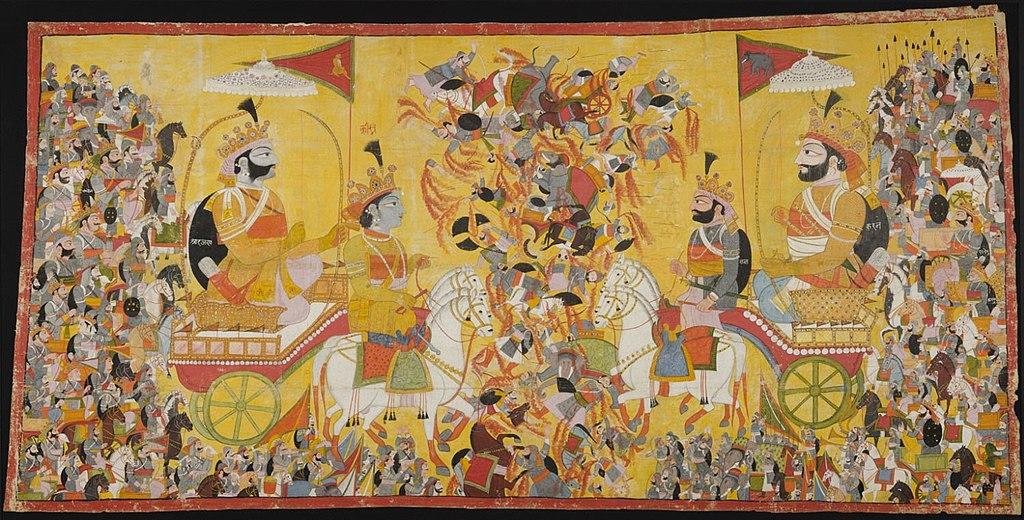
As the sun set in the west, the battlefield turned grim. Half of the warriors were slain, and the earth was littered with bodies, chariot remains, and destroyed armor. The scene was grotesque, with burnt and unrecognizable corpses. Vultures circled above, and jackals howled. Observing the encroaching darkness, Karna ordered a withdrawal, avoiding a night battle. The soldiers retreated, acknowledging their enemies’ prowess, and returned to their camps.
Day 17 of Kurukshetra – Death of Karna
Bhima Kills Dushasana
Duryodhana assigned Krpa, Asvatthama, Dushasana, and his remaining brothers to support Karna in an assault against Arjuna. The group charged at Arjuna, accompanied by thousands of elephants, chariots, and horsemen. In response, Arjuna met their attack with a barrage of whistling arrows. Bhima, filled with enthusiasm and armed with his conch, joined Arjuna to confront Duryodhana’s brothers. He unleashed deadly shafts against them, significantly reducing their numbers. However, around twenty princes remained, determined to avenge their fallen brothers.
Dushashana, fueled by anger, showcased his remarkable skill in battle. He hit Bhima forcefully with a dozen arrows, momentarily disorienting the Pandava. Exploiting this opportunity, Dushasana launched a dazzling arrow studded with diamonds and shining gems. The arrow, as powerful as thunder, struck Bhima’s chest, causing him to lose his senses and kneel for support.
Seizing the moment, Dushashana and his brothers targeted the weakened Bhima, showering him with arrows. Bhima, however, quickly recovered and retaliated. He threw a dart at Dushasana, who deftly shattered it mid-flight. Dushashana managed to cut Bhima with another arrow, causing a deep wound.
Enraged, Bhima vowed to exact revenge and charged toward Dushasana. Swinging his massive iron mace, he approached with a furious roar. Despite Dushashana’s attempt to thwart him with a blazing dart, Bhima shattered it with his mace. Bhima confronted Dushasana and delivered a devastating blow to his forehead, sending him flying from his chariot and leaving him dazed and bloodied.
Recalling his promise during the dice game, Bhima descended from his chariot and confronted the fallen Dushashana. Despite Dushashana’s futile resistance, Bhima relentlessly attacked, severing his arm. Bhima proclaimed his vengeance for Dushashana’s mistreatment of Draupadi and the Pandavas. He then struck a mortal blow, ripping open Dushashana’s chest and drinking his blood as he died.
Witnessing this gruesome act, the Kauravas were horrified and terrified by Bhima’s actions. Bhima reveled in his accomplishment, addressing Dushashana’s demise and the fulfillment of his vow. He turned to Arjuna and Krishna, expressing his satisfaction with avenging Draupadi and his determination to crush Duryodhana to find true peace.
Arjuna kills Karna
In a fierce battle, Arjuna and Karna clashed with volleys of arrows, covering the sky in darkness. The two warriors fought like elemental forces, countering each other’s attacks. They were compared to the sun and moon emerging from clouds. Despite the Kauravas’ attempts to distract Arjuna, he deflected their arrows and maintained his assault. Asvatthama advised Duryodhana to seek peace, but Duryodhana insisted on continuing the fight.
Arjuna and Karna engaged in a relentless exchange of celestial weapons, slaughtering thousands of troops, elephants, and horses. Karna’s efforts were thwarted by Arjuna’s skill and Krishna’s support. Asvasena, a Naga, tried to kill Arjuna but failed. Arjuna invoked powerful celestial weapons, with Krishna’s guidance, and the battle raged on.
Karna’s chariot was trapped, and he struggled to free it. Krishna rebuked Karna for invoking virtue, reminding him of his past misdeeds. Arjuna attacked Karna ferociously, and despite his wounds, Karna fought back with determination. Arjuna invoked the agneyastra, and Karna countered with the Varunastra, persistently attacking.
Amid the battle, Karna’s sunken chariot wheel and Arjuna’s moments of vulnerability created intense moments. Eventually, Arjuna’s powerful arrow severed Karna’s head, and his body fell. The Pandavas celebrated while Duryodhana and the Kauravas mourned the loss of their mighty warrior.
Day 18 of Kurukshetra – Fall of Duryodhana
On the 18th day of the Kurukshetra war, the Kauravas, led by Duryodhana, are on the brink of defeat. Duryodhana appoints Salya as their new commander, and they muster their remaining forces for one last effort. Yudhisthira seeks advice from Lord Krishna, who acknowledges Salya’s prowess but encourages Yudhisthira to fight and kill him.
The battle unfolds with intense combat between the Kauravas and the Pandavas. Heroes on both sides engage in duels, with Yudhisthira and Salya facing off. The battle rages on, and Yudhisthira and his brothers work together to vanquish Salya and the Kaurava warriors.
Arjuna fights valiantly, taking on multiple opponents and proving his might. Sahadeva fulfills his vow by slaying Sakuni, who had been a cause of much trouble for the Pandavas. The Kauravas, led by Duryodhana, fight desperately, but the Pandavas gain the upper hand.
Duryodhana, realizing the dire situation, decides to flee from the battlefield and hides in a lake. His remaining commanders, Krpa, Asvatthama, and Krtavarma, try to persuade him to come back and fight, but he remains hidden. Meanwhile, a group of hunters overhears the conversation and learns of Duryodhana’s whereabouts.
Bhima kills Duryodhana
In a great battle, the gods, celestial beings, and sages gathered to witness the fight between Bhima and Duryodhana. The combatants displayed incredible skill and speed as they sought each other’s weaknesses. The fight was intense, with maces clashing like thunder. They exchanged powerful blows, and Duryodhana’s skill began to overpower Bhima. Bhima attempted to strike back with immense force, but Duryodhana’s agility and skill allowed him to evade the attacks.
As the fight continued, Bhima unleashed a powerful mace strike that hit Duryodhana’s side, momentarily incapacitating him. However, Duryodhana quickly recovered and, empowered by his mother’s glance, fought back fiercely. He struck Bhima on the forehead, leaving Bhima unshaken. The battle continued with each fighter demonstrating their prowess, but Duryodhana’s skill seemed to give him the upper hand.
Bhima, frustrated by Duryodhana’s tactics, resorted to a cunning move. He used the sling of his mace to deliver a thunderous blow to Duryodhana’s thighs, rendering him incapacitated and ending the fight. The Pandavas cheered in joy, and the earth trembled with omens.
Balarama was displeased by Bhima’s use of an unfair tactic and intended to intervene. However, Krishna stopped him, explaining that Duryodhana’s defeat was the result of his own actions and Bhima’s vow. The victory was necessary for the Pandavas’ cause.
After Duryodhana’s defeat, Yudhisthira consoled him, reminding him of the consequences of his own deeds. Krishna also comforted the Pandavas, assuring them that their victory was just and necessary. The battle marked the end of Duryodhana’s power, and the Pandavas left the battlefield, leaving Duryodhana to his fate.
As Duryodhana lay on his deathbed, his loyal allies Ashwatthama, Kripacharya, and Kritavarma gathered around him, their hearts filled with a solemn vow to avenge the wrongs done to their fallen friend. They pledged to take revenge against Bhima for his role in Duryodhana’s defeat and impending demise.
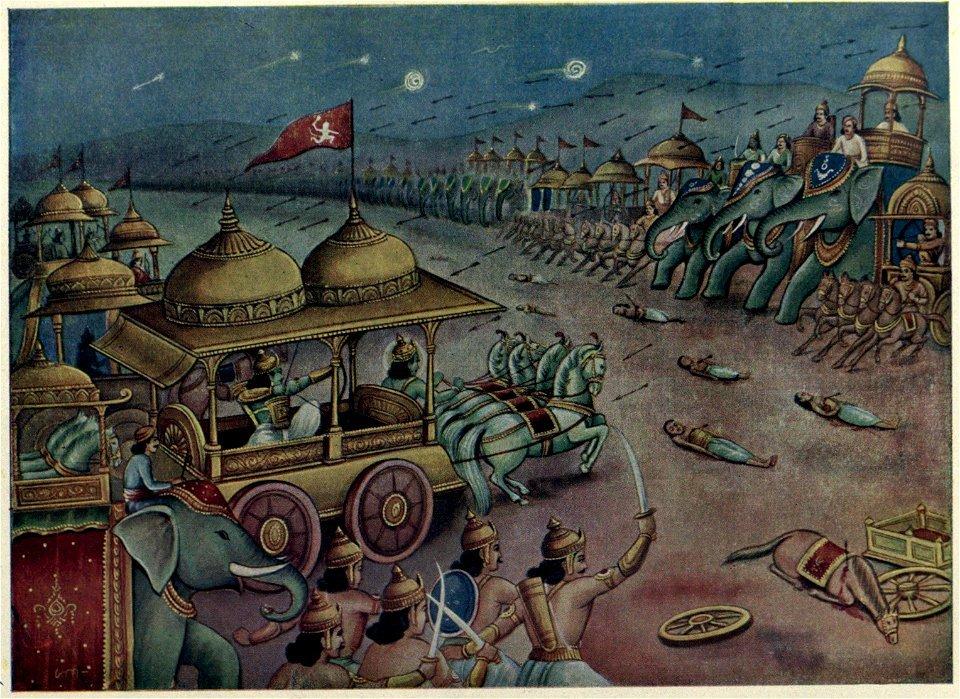
Under the cover of night, the trio launched a surprise attack on the Pandavas’ camp, driven by a burning desire for retribution. Their objective was to eliminate all of the Pandava brothers and thereby avenge Duryodhana’s suffering.
However, the chaotic darkness of the night led to a tragic and heart-wrenching outcome. In the midst of the furious clash, the lines between friend and foe blurred in the shadows. Amidst the confusion and tumult, Dhrishtadyumna, the valiant commander, Shikhandi, the courageous warrior, and Uttamaujas, the skilled fighter, met their unfortunate demise at the hands of Ashwatthama, Kripacharya, and Kritavarma. Even more tragically, in the chaos, the innocent children of Draupadi were mistaken for the Pandava brothers and fell victim to the relentless battle, their lives tragically cut short.
After the tumultuous Kurukshetra war, the survivors were a select few: the five valiant Pandava brothers, the indomitable Sri Krishna, the unwavering Satyaki, the complex figure Ashwatthama, the wise Kripacharya, the loyal Yuyutsu, the legacy-bearing Vrishakethu, and the influential Kritvarma. The aftermath ushered in a new era, with Yudhishthira assuming the throne of Hastinapur. His 36-year reign symbolized his dedication and wisdom in leading the realm, but as time passed, he felt the call of renunciation. Transferring the crown to Arjuna’s grandson, King Parikshit, after the passing of Krishna, Yudhishthira’s decision marked a profound transition in the dynasty’s leadership. Embarking on a spiritual journey to the Himalayas, Yudhishthira, accompanied by his brothers and Draupadi, sought the path to heaven. Along the way, the journey claimed the lives of Draupadi and four Pandavas—Bhima, Arjuna, Nakula, and Sahadeva. Yudhishthira emerged as the solitary survivor, known for his virtuous heart. Yudhishthira was extended an invitation to ascend to the heavens in his mortal form, culminating his life’s journey with a divine grace that transcended the earthly realm.